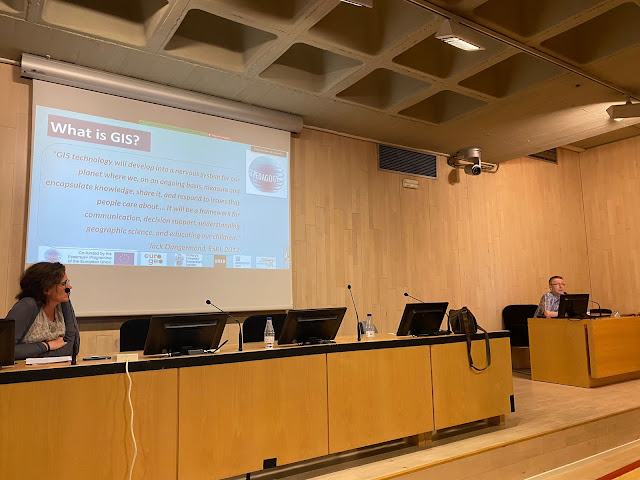It's the final day of my GA Presidency today.
An August summary will be posted later today on the GA Presidents blog, showing the sort of things I got up to this month working in the role.
The year has gone very quickly and it has been a tremendous privilege to serve as the 106th President of the Geographical Association.
I would like to thank anyone who has done everything for the GA during the year, and who I've worked with on different events.
Particular thanks to Alan Kinder and all the team at Solly Street, particularly Isabel Richardson and Becky Kitchen who coordinated the GA Conference this year. It's a small team that very much punches above its weight.
Thanks to everyone who serves on a GA committee or special interest group or supports the work of a GA Branch. Thanks also to those on a number of working groups whose work will appear during the tenure of the next President - there are continual tweaks happening which are often hidden away until their impact can be seen.Thanks to all involved in creating the GA's publications and journals. I've been able to contribute to three out of the four journals this year, writing a number of articles. I've written for other journals as well, and also for the GEO website.
Thanks to all those who heard me speak at events in a number of countries and online, or invited me to speak at their event - I was able to visit a wide range of locations (although not as many as I might have done before the pandemic).
Thanks to Paula Richardson for instigating and developing the support for the GA's National Fieldwork Week along with me, and some other colleagues. I hope this becomes an annual event.
Special thanks to all the team at the GA Conference 2022 which ensured that we got 'back in the room' - here they are pictured at the end of the final day when the delegates were all heading home happy. Plans are already underway for the GA Conference 2023.
Thanks also to everyone who presented at the conference and put themselves forward, and also to anyone who came along whether in person or virtually.
It's so important for the GA's identity and for the support we offer to colleagues.
Thanks to Susan Pike and Alastair Owens - the other members of the Governance Working Group - along with Olwen Lintern-Smyth and Bob Digby, plus members of the GA's Education Group.
Thanks also to the Governing Body - pictured here in June 2022 at Queen Mary University of London. Since then, we have had two people leave the group, who have been replaced by some new Governors. Thanks to Tariq Jazeel and Susan Pike who have stepped down. I have one more year, and therefore three more meetings as Past President, and then I will leave GB too.
Thanks to the geography department at King's Ely, who turned out in force to attend the conference, and are pictured below (just Kathryn missing) - we have said goodbye to Seb and Alex at the end of the year, and will be welcoming Barry (and Emma back from maternity leave) next week.
Thanks also to John Attwater, Richard Whymark and other King's Ely SLT who kindly cut me a bit of timetable slack during the year. Thanks also to all King's Ely Junior staff who covered for me in my absence.
I will be maintaining my GA Presidents Blog for the foreseeable future.
There's plenty more to discover still about the work of the GA since 1893.
And finally thanks most of all go to my family: Sally, Ella and Sam for all their support through the year, and in the previous years that I've disappeared on GA business.
Over to you Alastair from tomorrow, when a biography will be added to the GA Presidents blog.





































